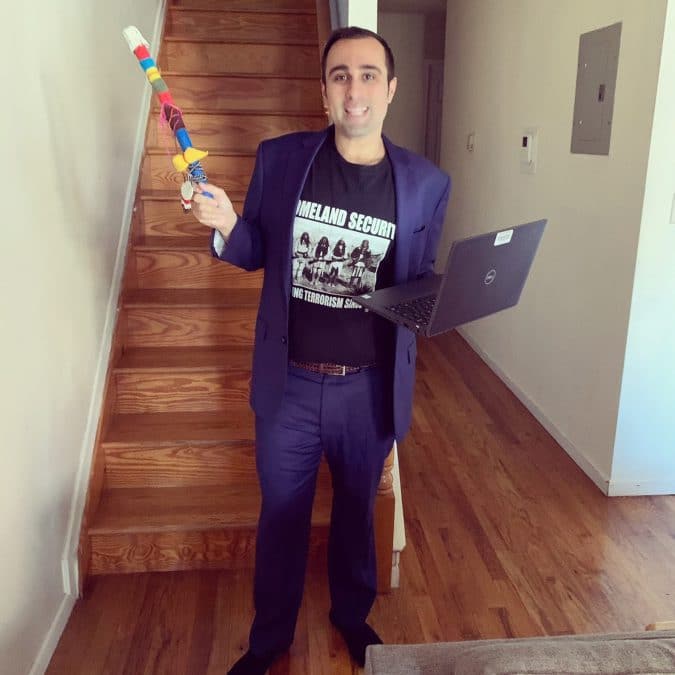Noticing the lack of materials available regarding the Indian Child Welfare Act, Citizen Potawatomi Nation tribal member Omar Rana set out to make a change. He crafted an educational presentation on ICWA in fall 2020 that eventually became an official continuing education program for his fellow colleagues at the Legal Aid Society of New York City.

As a staff attorney at the organization, Rana represents children in the court systems. After taking the job, he realized the nonprofit had limited knowledge available for its workforce regarding Native American children and ICWA. He believes the protections provided through ICWA “is important to the survival of so many Indigenous communities.”
According to the U.S. Office of Indian Services, “The purpose of the Indian Child Welfare Act (ICWA) is ‘ …to protect the best interest of Indian Children and to promote the stability and security of Indian tribes and families by the establishment of minimum Federal standards for the removal of Indian children and placement of such children in homes which will reflect the unique values of Indian culture.’”
Before 1978, removing Native children from their families and placing them within non-Native homes was commonplace and served as a form of forced assimilation. ICWA sets standards for states to work with tribes when Native American children become involved in child abuse, neglect and adoption cases. It also encourages the placement of these children with tribal foster families.
“ICWA is so important in the fact that it’s helping preserve our culture and its helping (overturn) centuries of degradation and centuries of trying to break our culture,” Rana said. “Our culture is very alive and very well, and this is something that is protecting it for future generations.
“It’s is a safeguard for not only children to be connected to their culture and be proud of who they are but also for tribal sovereignty and the legitimacy of the tribal system.”
When an ICWA-indicated case came across Rana’s desk, he researched resources within his organization to provide guidance. After utilizing all internal materials tied to ICWA, he began looking externally to learn as much as possible, and he compiled his findings to pass onto to his colleagues.
“I wanted to start by doing a presentation, but then my supervisors were like, ‘You should actually do this as a training and develop it more,’’’ he said.
Rana served as the keynote for Legal Aid’s meeting during November as a part of Native American Heritage month, and has since led three separate continuing education courses. Due to the coronavirus, the virtual sessions have provided an opportunity for more people to attend than might have otherwise.
“It’s gotten really positive feedback, and I’m glad. I feel like I’ve helped fix an issue that we’ve had because I think it was a really big problem that we didn’t have a training for ICWA,” Rana said.
Inspiration
Rana grew up in Tulsa, Oklahoma, and has both Pakistani and Potawatomi heritage. He felt studying law could help lend a voice and uplift fellow South Asians and Native Americans as well as other minorities.
“I always had an interest in politics, and … this is something I could have talents in but also something I could be achieving the goal of helping other marginalized people,” he said.
Before attending Rutgers University’s law program, Rana studied at Kansas University and participated in the institution’s partnership with Haskell Indian Nations University. Through this experience, he became more acquainted with his Native American heritage. Living in the New York metropolitan area, Rana has a sense of connection to his South Asian background, but he felt like it has become harder to remain associated with his Potawatomi roots. The training assists with building a bridge between his Indigeneity and career as a lawyer.
“This is a way — and has been a really positive experience for me — to be able to show this part of my heritage and show that I’m really proud of it,” he said.
Future
The U.S. court system has the ability to overturn ICWA, but Rana said everyone can make a difference by voting for elected officials and judges that support the federal law. Additionally, he wants lawyers and others working in child welfare to utilize the resources provided through the Bureau of Indian Affairs that list the best contacts for each tribe. Find the database at cpn.news/biaicwa.
“One thing I try to impress upon in my training is when you say call the office of the chief of the Cherokee Nation about an ICWA-indicated case … it would be like if you called the governor of Alaska and you were asking about this one person who could be a citizen of that state,” Rana said.
When a Native American child enters the welfare system, ICWA requires reaching out to the Native Nation from which they belong. Utilizing the BIA’s database saves precious time by increasing the likelihood of reaching the correct individual(s) within tribes.
Although ICWA establishes a foundation for protecting Native American children from forced assimilation through the child welfare system, he said a tremendous amount of work lies ahead given the overrepresentation of Native American children in foster care. Rana hopes by educating others, he’s helping provide solutions that will continue to move efforts forward.
Find more information on The Legal Aid Society – New York City, visit legalaidnyc.org.
